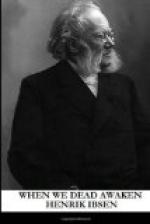Then what would you put in its place?
PROFESSOR RUBEK.
Life, Maia.
MAIA.
Life?
PROFESSOR RUBEK.
Yes, is not life in sunshine and in beauty a hundred times better worth while than to hang about to the end of your days in a raw, damp hole, and wear yourself out in a perpetual struggle with lumps of clay and blocks of stone?
MAIA.
[With a little sigh.] Yes, I have always thought so, certainly.
PROFESSOR RUBEK.
And then I had become rich enough to live in luxury and in indolent, quivering sunshine. I was able to build myself the villa on the Lake of Taunitz, and the palazzo in the capital,—and all the rest of it.
MAIA.
[Taking up his tone.] And last but not least, you could afford to treat yourself to me, too. And you gave me leave to share in all your treasures.
PROFESSOR RUBEK.
[Jesting, so as to turn the conversation.] Did I not promise to take you up to a high enough mountain and show you all the glory of the world?
MAIA.
[With a gentle expression.] You have perhaps taken me up with you to a high enough mountain, Rubek—but you have not shown me all the glory of the world.
PROFESSOR RUBEK.
[With a laugh of irritation.] How insatiable you are, Maia.! Absolutely insatiable! [With a vehement outburst.] But do you know what is the most hopeless thing of all, Maia? Can you guess that?
MAIA.
[With quiet defiance.] Yes, I suppose it is that you have gone and tied yourself to me—for life.
PROFESSOR RUBEK.
I would not have expressed myself so heartlessly.
MAIA.
But you would have meant it just as heartlessly.
PROFESSOR RUBEK.
You have no clear idea of the inner workings of an artist’s nature.
MAIA.
[Smiling and shaking her head.] Good heavens, I haven’t even a clear idea of the inner workings of my own nature.




